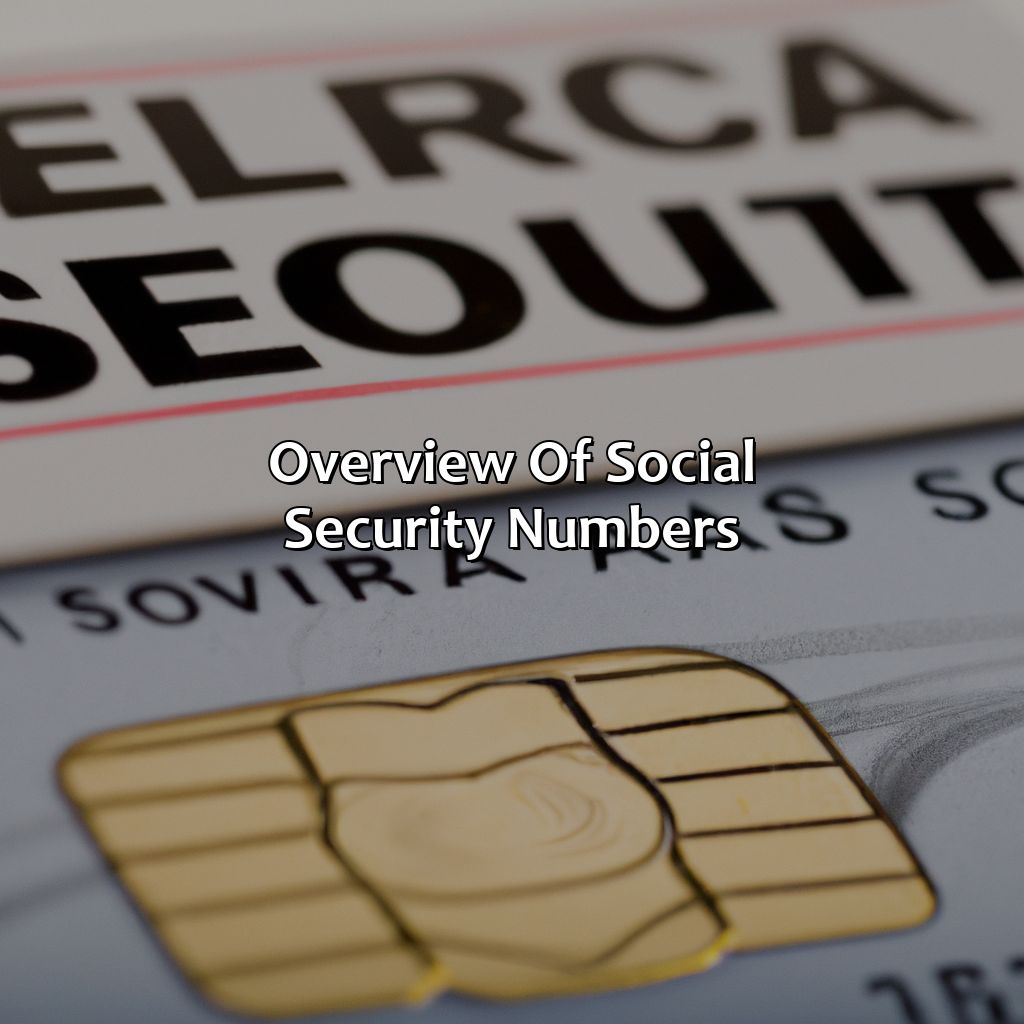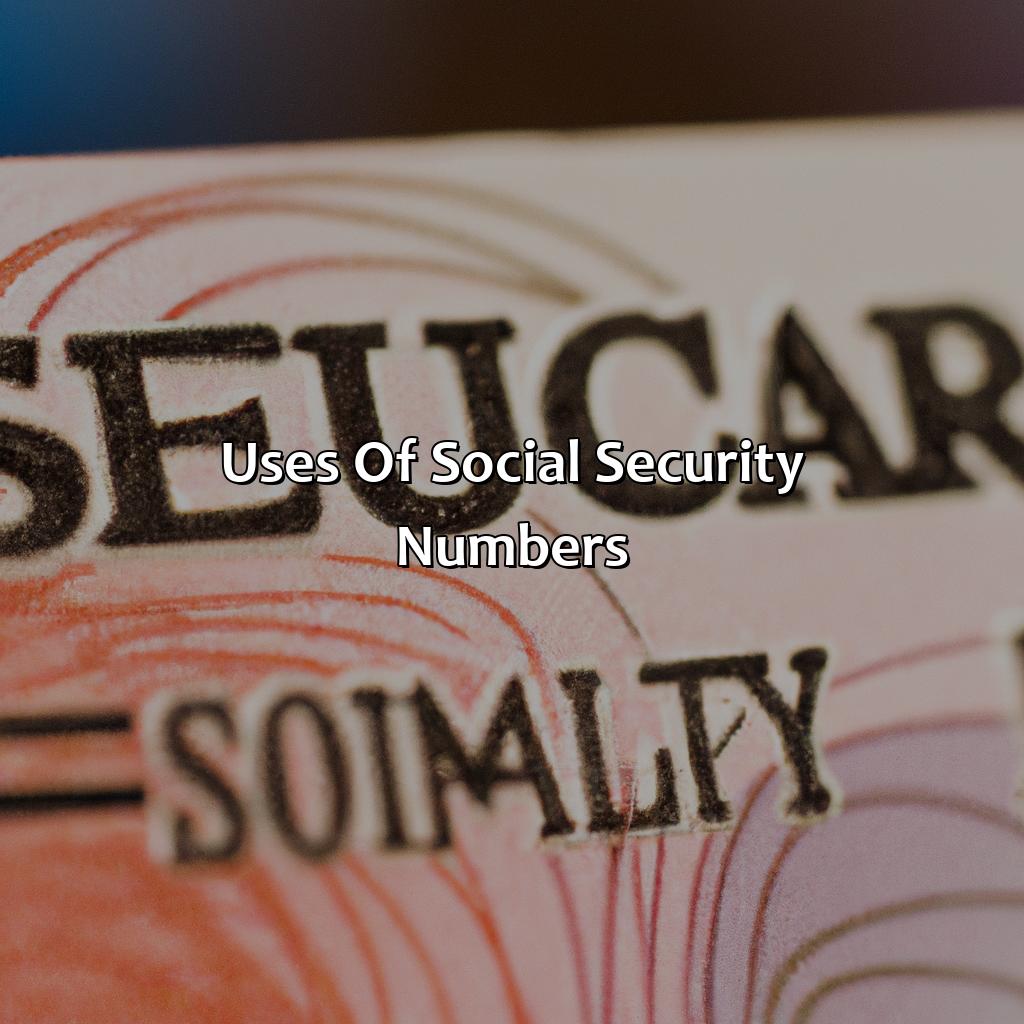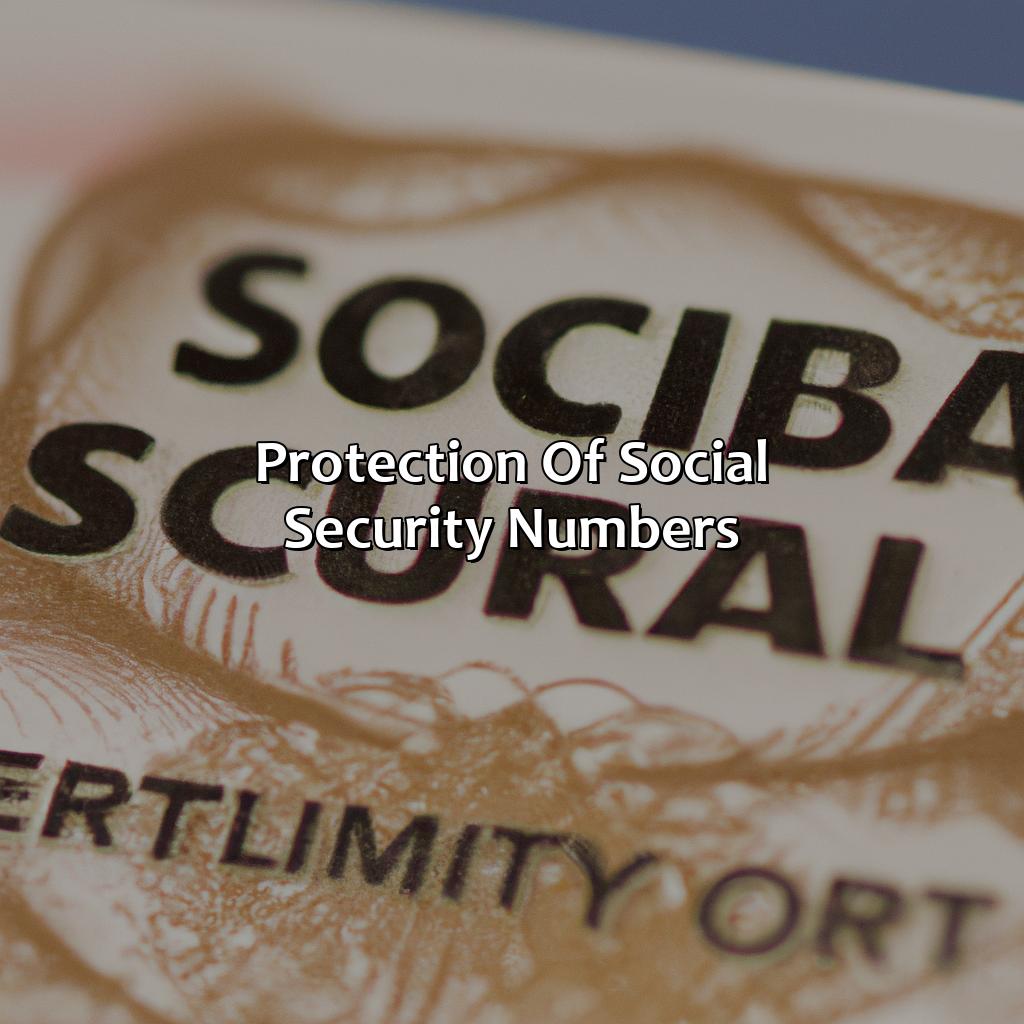What Are Social Security Numbers Used For?
Key Takeaway:
- Social Security Numbers (SSN) are unique identification numbers assigned by the Social Security Administration to US citizens and eligible non-citizens. They are used for a variety of purposes, including employment, tax, benefits, and identification.
- Employment and tax purposes: Employers use SSN to verify employee identity, report wages and tax contributions to the IRS, and determine eligibility for Social Security benefits. Individuals must provide their SSN to employers to be hired.
- Benefits and assistance programs: SSN is used to verify eligibility for various government-assisted programs, such as Social Security retirement, disability, and survivor benefits, as well as Medicaid and Medicare. Individuals applying for these programs will need to provide their SSN.
- Credit reports and loans: Financial institutions and credit bureaus use SSN to verify credit history and determine loan eligibility. SSN is used to pull credit reports, apply for loans, and establish credit.
- Identification and security: SSN serves as a unique identifier for individuals across various institutions and organizations, such as banks, schools, and government offices. However, it is important to protect SSN from identity theft and fraud by only sharing it when necessary and keeping it secure.
Are you having second thoughts about the use of social security numbers? Discover what social security numbers are used for and how to best secure your identity online. You’ll gain peace of mind and the assurance of taking the necessary precautions.
Overview of Social Security Numbers
Social Security Numbers are unique nine-digit identification numbers assigned to citizens, permanent residents, and temporary working residents by the Social Security Administration. They are used to track and record an individual’s earnings and work history for Social Security benefits. Additionally, they are used for tax purposes, financial transactions, and employment verification. Social Security Numbers are a crucial component of identity verification and prevent fraudulent activities. It is essential to safeguard the confidentiality of your Social Security Number to prevent identity theft and fraud.
Moreover, Social Security Numbers are required for various legal and governmental procedures, including applying for a driver’s license, obtaining a passport, enrolling in Medicare, and receiving government benefits. The importance of Social Security Numbers makes them highly valuable to hackers and cybercriminals who can use them to commit identity theft, which can have long-lasting consequences. Thus, it is essential to be extremely cautious when sharing your Social Security Number and ensure that it is not compromised.
In recent years, there have been several instances of data breaches at large companies where millions of Social Security Numbers were stolen. This has resulted in many people becoming victims of identity theft and facing the consequences of the breach for years to come. Therefore, it is crucial to be vigilant about protecting your Social Security Number and regularly monitor your credit reports to detect any suspicious activity.
A true story that highlights the importance of safeguarding your Social Security Number is that of a woman who shared her Social Security Number with someone she thought was a legitimate government representative. However, in reality, the person was a scammer who used her number to open fraudulent bank accounts and apply for credit cards, causing her significant financial loss and stress. This serves as a reminder of the importance of being cautious when sharing sensitive information like your Social Security Number.

Image credits: retiregenz.com by David Washington
Uses of Social Security Numbers
To explore the practical applications of Social Security Numbers, delve into the section on their Uses. Focus on:
- Employment and Tax Purposes
- Benefits and Assistance Programs
- Credit Reports and Loans
- Identification and Security
Uncover the diverse benefits of Social Security Numbers!

Image credits: retiregenz.com by Harry Washington
Employment and Tax Purposes
In the contemporary world, Social Security Numbers have become an indispensable part of life. They serve a myriad of purposes, including facilitating Employment and Tax Verification. At its core, Employment and Tax Verification is about establishing identity and monitoring financial activities.
For employers, the SSN is significant in verifying an employee’s identity and confirming their eligibility to work in the US. The IRS uses SSN to track taxable income, determine earnings for calculating social security benefits, and ensure compliance with tax regulations. Individuals must provide accurate SSN information for their employment records and tax returns.
A unique feature of SSN usage towards employment lies in how employers use it for administration purposes such as medical insurance coverage, pension plans, retirement benefits, and payment processing tools. These systems require reliable employee data that draws from an individual’s social security account.
It is crucial to protect your Social Security Number by keeping personal information secure. Individuals should avoid sharing their SSN online or providing it unnecessarily unless required by Federal law or an authorized agency. Protecting your number reduces the risk of identity theft and unauthorized access to financial accounts.
A social security number is like a golden ticket to access benefits and assistance programs, but unfortunately, it’s also like a lottery number for identity thieves.
Benefits and Assistance Programs
This section covers the various social security number uses in Benefits and Assistance Programs.
- Public Pension Plans – SSN is used as a unique identifier for individuals receiving public pensions.
- Disability Benefits- Social security numbers are used to determine the eligibility of a person seeking disability benefits, which includes Supplemental Security Income (SSI) and Social Security Disability Insurance (SSDI).
- Healthcare Programs – Medicare, Medicaid, and other state health care programs use SSN to track eligibility status of participants.
- Unemployment Compensation – SSN is required by law for the administration of unemployment insurance claims.
It is essential to note that Social Security numbers are not used exclusively in Benefits and Assistance Programs. Other institutions use them for identification purposes, such as background checks before employment opportunities.
Over time, SSNs have become widely adopted because they uniquely identify individuals and deter fraudulent activities. However, some people argue that their extensive usage poses potential privacy risks.
During World War II, President Franklin D. Roosevelt signed into law the Social Security Act OASDI program on August 14th, 1935. Since then, Social Security has been an effective means of addressing poverty and old-age benefits for American workers.
Your credit report is like a report card, except instead of grades, it’s just a list of bad decisions you’ve made with money.
Credit Reports and Loans
Your social security number is utilized by lenders and banks to assess creditworthiness prior to issuing loans, credit cards, and mortgages. It plays an essential role in creating your credit report, which contains information regarding borrowing history, payment patterns, debts, and default charges. Additionally, it helps you acquire better interest rates on loans since each lender verifies the applicant’s identity through their SSN.
More importantly, financial firms monitor a borrower’s credit behavior over time by reviewing their reports regularly. They use this data to make decisions on approving or rejecting loan requests and adjust the interest rate accordingly to minimize their risk.
Furthermore, your SSN can also provide a sense of security while dealing with finances since any unauthorized account access or suspicious activity via your SSN can be tracked down right away.
In summary, creditors rely heavily on social security numbers to assess creditworthiness of potential applicants. Without an SSN, obtaining loans may become challenging; monitoring reports can get tedious without this 9-digit code as well. Thus, protecting sensitive information remains critical.
Make sure to protect your personal information and be aware of online scams that ask for your SSN. Stay informed to prevent misuse of your credentials and keep up with its importance in the credit industry today!
Your social security number is like a password, except everyone knows it and it’s impossible to change.
Identification and Security
Social Security Numbers (SSN) play a vital role in identification and security. These numbers serve as a unique identifier for each individual, ensuring that their personal, financial, and medical records are kept secure. Additionally, SSNs are essential in verifying a person’s identity during various transactions, such as opening bank accounts or applying for government benefits.
Moreover, SSNs provide an additional level of validation when it comes to security measures such as background checks or credit score inquiries. These numbers can help verify that the information provided is indeed accurate and prevent fraud from occurring.
One critical aspect of SSNs is their use in tax filing and social security benefits distribution. Without social security numbers, individuals wouldn’t be able to claim their entitled benefits or file their taxes accurately.
To ensure the safety of SSNs, individuals must keep them confidential when sharing personal information over the internet or phone, especially with unknown parties. Moreover, in case someone suspects fraudulent activities using their SSN must take immediate action by reporting it to relevant authorities. Overall SSNs are sensitive but essential data to maintain safety and secure people’s identities.
Protect your Social Security number like it’s the last cookie in the jar, or you’ll be left with identity theft crumbs.
Protection of Social Security Numbers
Keep your Social Security Number secure! Prevention of Identity Theft, Safe Storage and Disposal, and Reporting Suspicious Activity are all key. Store your personal information safely to stop malicious individuals from accessing it. If something suspicious happens, report it to protect yourself. These steps will help keep your info secure.

Image credits: retiregenz.com by Harry Jones
Prevention of Identity Theft
Identity Protection Reserve
In the digital world, Identity theft is a common concern of individuals, organizations and governments worldwide. It is important to take steps to prevent cybercriminals from stealing sensitive information. One way to achieve this is by setting up an Identity Protection Reserve.
An Identity Protection Reserve can help individuals keep their private information, such as Social Security Numbers, safe from fraudsters’ reach. This reserve provides additional security layers preventing any unauthorized access or suspicious activity.
Moreover, creating strong passwords and securing personal devices that contain sensitive data can also mitigate cyber threats. It’s essential to keep confidential information confidential and not share it with anyone unless it’s necessary.
Sharing of Sensitive Data
Additionally, many Social Security Numbers are shared for various purposes like business transactions, medical records or applying for loans. While sharing this information is necessary at times, it’s crucial to ensure that only appropriate entities have access to such data.
Organizations must have robust security measures in place while handling such confidential information. They should educate all employees on best practices regarding social security numbers protection.
Individuals must assess the company they are providing their numbers too carefully ensuring they have secure means of data storage and management.
Protecting your identity from fraudsters requires constant vigilance and continuous education about the latest cyber threats. By following some basic cybersecurity tips like setting up an identity protection reserve, user awareness training about the importance of protecting sensitive data and secure password creation can reduce unauthorized use of your Social Security Number effectively.
Remember, keeping your social security number safe is like hiding the last slice of pizza – protect it at all costs.
Safe Storage and Disposal
To ensure the protection of Social Security Numbers, it is important to store and dispose of them safely. This requires proper management and control of the identification numbers to avoid data breaches, identity theft or fraud.
When storing Social Security Numbers, use encryption or password-protected files to keep them secure. Limit access to employees who have a legitimate reason for requesting the information. Ensure that physical documents containing the identification numbers are locked in a secure location.
Disposing of Social Security Numbers requires shredding paper documents and deleting digital information completely from storage devices. Ensure that disposal methods comply with regulatory requirements for electronic records by disconnecting hard drives and wiping all data.
It is important to remember that there are several potential risks associated with not properly safeguarding Social Security Numbers. Mishandling of these critical identification numbers can subject individuals to privacy violations, reputational damage or even financial ruin.
By implementing secure storage and responsible disposal techniques, sensitive information can be protected from unauthorized access and misuse. Proper education training programs on how to handle sensitive information should be mandatory parts of employee orientation sessions to ensure accountability.
Overall, continually reviewing safety protocols will help identify gaps for updates as technological advancements emerge. Continuously finding new ways to Mitigate risks will keep Social Security Number safe now and into the future.
Why wait for the FBI to come knocking when you can report suspicious activity yourself? It’s like being your own private investigator, but without the fancy hat.
Reporting Suspicious Activity
If you witness any suspicious activity related to the use of Social Security Numbers, it is your responsibility to report it. Informing relevant authorities about such activities contributes to protecting sensitive information from identity theft crimes.
It is crucial to report suspicious activity immediately as delays can lead to severe complications. Some common signs of suspicious activity include receiving unsolicited phone calls or emails asking for personal information, unauthorized access to your financial accounts, and unfamiliar transactions on your credit card statements.
In case of suspicious activity reported by others, it is recommended to cooperate with law enforcement agencies and provide any necessary assistance. Remember that prompt reporting of any such incidents can prevent further damages and protect vulnerable individuals.
Pro Tip: Spread awareness among your peers and family about the significance of protecting Social Security Numbers. By doing this, you can be an active participant in safeguarding sensitive information from hackers and malicious actors.
Some Facts About Social Security Numbers:
Social Security numbers are used to track an individual’s earnings and determine eligibility for Social Security benefits. (Source: Social Security Administration)
Employers are required to collect Social Security numbers from their employees and report their earnings to the government. (Source: IRS)
Social Security numbers are also used as identification for various purposes, such as opening a bank account, applying for credit, and obtaining a driver’s license. (Source: U.S. Department of State)
Protecting your Social Security number is important for preventing identity theft and fraud. (Source: Federal Trade Commission)
Social Security numbers are nine digits long and are assigned by the Social Security Administration to U.S. citizens, permanent residents, and certain non-immigrants who are authorized to work in the United States. (Source: U.S. Citizenship and Immigration Services)
FAQs about What Are Social Security Numbers Used For?
What are social security numbers used for?
Social Security Numbers (SSNs) are primarily used for identification purposes. They are used to verify your identity when you apply for a job, open a bank account, apply for credit, and file taxes.
Do I need a social security number to work?
Yes, in the United States, you need a social security number to work and get paid. Your employer uses your SSN to report your wages to the government, and it also helps track your work history for social security and Medicare benefits.
Who can ask for my social security number?
Any legitimate employer, financial institution, or government agency can ask for your social security number. Additionally, landlords, utility companies, and healthcare providers may ask for it to confirm your identity or creditworthiness. However, you should be cautious about providing your SSN to anyone who does not have a legitimate reason to ask for it.
Can my social security number be used for identity theft?
Yes, social security numbers are a popular target for identity thieves. If someone gets hold of your social security number, they can use it to open credit accounts, file fraudulent tax returns, and commit other crimes in your name. Be careful about sharing your SSN and regularly monitor your credit reports for suspicious activity.
What should I do if I suspect someone is fraudulently using my social security number?
If you suspect someone is fraudulently using your social security number, you should contact the Social Security Administration (SSA) immediately. They can place a fraud alert on your account and provide instructions on how to protect yourself. You should also contact the three major credit bureaus (Equifax, Experian, and TransUnion) to place a fraud alert on your credit reports.
Can I change my social security number?
It is rare, but it is possible to change your social security number in certain circumstances, such as if you have been a victim of identity theft and the SSA determines that the misuse of your SSN is causing significant harm. However, changing your SSN is not a simple process, and you will need to provide evidence of the harm caused by the misuse of your SSN.
 Checkout this IRS Loophole
Checkout this IRS Loophole 
